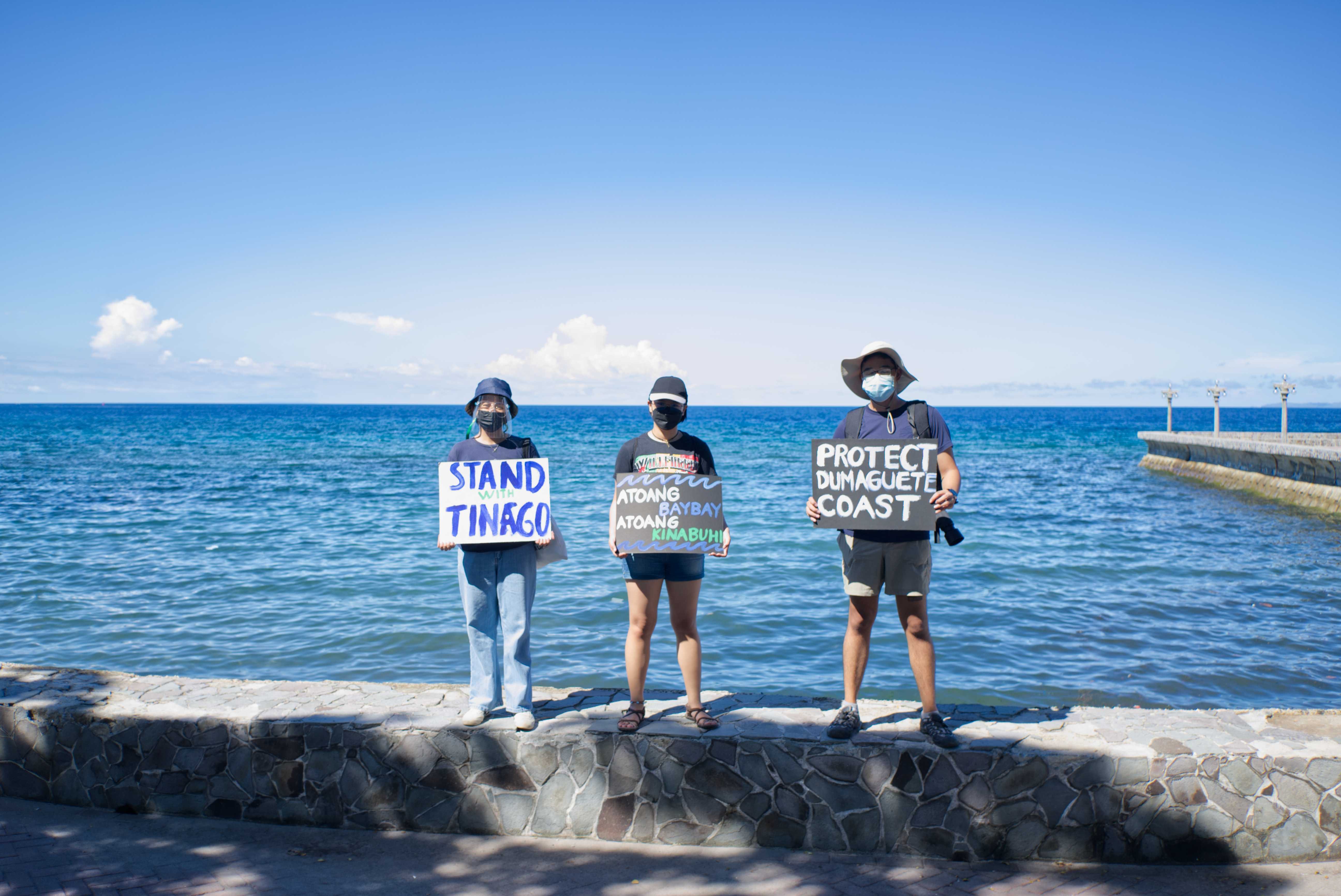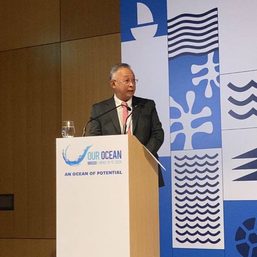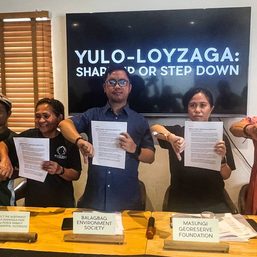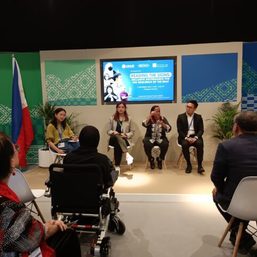SUMMARY
This is AI generated summarization, which may have errors. For context, always refer to the full article.

The Dumaguete City Council rejected a motion that would have withdrawn the authority they gave Mayor Felipe Remollo to sign a revised joint venture agreement (JVA) with developer E.M. Cuerpo, Inc. (EMCI) to kickstart the controversial “smart city” reclamation project.
The councilors voted 5-6 to the motion laid by Councilor Joe Kenneth Arbas. This is a motion for reconsideration for the authority given by the council on Wednesday, July 14, to sign the revised JVA (also called a memorandum of understanding, as requested by Mayor Remollo).
Councilors Arbas, Rosel Erames, Renz Macion, Agustin Miguel Perdices, and Bernice Elmaco, who followed the proceedings remotely, voted for the motion.
Those who opposed the motion were Councilors Dionie Amores, Michael Bandal, Edgar Lentorio, Manuel Patrimonio, Lilani Ramon, and Manuel Sagarbarria.
Arbas put forward the motion as a “question of law” in light of lawyer Golda Benjamin’s presentation to the City Council outlining the deficiencies of the agreement, and to allow the people to examine and deliberate the proposal more carefully.
In a separate motion, however, the council voted for a motion for reconsideration that effectively withdraws the resolution of “no objection” on the project which they passed last July 14. This resolution of “no objection” is among the requirements needed to secure a permit from the Philippine Reclamation Authority.
The controversial reclamation project has met intense opposition from residents, environmentalists, and civil society since it was first introduced publicly at a July 7 City Council session. Critics cite the adverse environmental, social, and cultural effects on the city, as well as the lack of transparency and consultations surrounding the proposal.
In their July 14 session, the council revoked Remollo’s authority to sign a previous JV agreement issued on July 7, only to grant it again for a “memorandum of understanding” or “revised JVA” requested by Mayor Remollo that supposedly took into consideration people’s comments.
Already the PPP contract
In her presentation, Benjamin said that the draft joint venture agreement is actually the draft public-private partnership (PPP) contract based on the process it had undergone.
Thus, Benjamin said that public consultations should have been conducted before the council gave Mayor Remollo the authority to sign the contract, as mandated by Section 13(l) of the 2021 Dumaguete City PPP ordinance.
“So mag review ta. After ang mga partido, ang mga parties ang city ug si EM Cuerpo, naggahin ug pag-negotiate, atong pangutan-on ang atong kaugalingon: ang mogawas ba ana kontrata or mere framework agreement? Common sense ra ang kinahanglan, dili kailangan ug abogado. Kontrata ang mogawas. This is classic, very basic procurement law.”
(So let’s review. After the parties – the city and E.M. Cuerpo – allocated [time] to negotiate [for two years], let’s ask ourselves: is the outcome a contract or a mere framework agreement? Common sense is all you need. You don’t need a lawyer. A contract will be the outcome. This is classic, very basic procurement law.)
Based on the timeline indicated in the previous draft JV agreement, EMCI first submitted an unsolicited proposal to the Dumaguete local government on November 25, 2019.
Negotiations between the project proponent and the city government took place in February 2020. After the recent Swiss Challenge, wherein no other private entities submitted competitive bids, the local government issued a Notice of Award to EMCI on June 23, 2021.
Under the Philippine Reclamation Authority (PRA) guidelines and the 2021 Dumaguete City PPP ordinance, a joint venture is a “recognized modality” for PPPs in which the government and the private sector exchange resources toward “achieving better quality of life for Filipinos and serving the public good.”
Benjamin noted that based on the previous draft JV agreement, the word “joint venture” appeared 11 times, while the term “memorandum of agreement” only appeared in relation to the agreement between the City of Dumaguete and the PRA.
Need for consultation
Benjamin said that consultations would have surfaced issues regarding the contractor EMCI. Based on her research, Benjamin said that EMCI has not been involved in any reclamation projects, and the company’s net worth is not enough to finance the P23-billion price tag of the project.
She also raised the alarm on EMCI’s alleged links with the Chinese company Poly Changda Overseas Engineering, Inc., which widely circulated but unconfirmed documents show had been subcontracted by EMCI for the Dumaguete project.
“Mao ni ang atong mga importante karon, kinahanglan tang mokaon, kinahanglan tang motabang sa mga pobre, dili to potentially let a foreign, foreign company dredge and destroy our ocean potentially,” she said.
(These are the important things: we need to eat, we need to help the poor, and not potentially let a foreign company dredge and destroy our ocean.)
Benjamin mentioned other provisions that would be economically disadvantageous to the city, such as the waiving of regulatory and local fees during the duration of construction, and the small amount of land that would be left to the City of Dumaguete once EMCI and PRA’s shares are accounted for.
She said that allowing an unqualified contractor to take on a massive but ultimately disadvantageous contract may be considered a “corrupt practice.”
“My question now is: should Dumaguete give an illegal, environmentally catastrophic, economically disadvantageous, and corrupt contract a chance? Is that what we deserve, ladies and gentlemen? The people of Dumaguete deserve better,” Benjamin said.
City Legal Officer Manny Arbon, however, reiterated the city government’s position that the revised JVA or memorandum of agreement is not yet the draft PPP contract as it will only be drafted once the Philippine Reclamation Authority grants a permit for the reclamation.
Arbon also said that there are provisions such as “risk assessment,” “risk assignments,” and “allocations” that are supposed to be in a PPP contract that are not yet in the revised JVA/MOU.
Councilor Perdices, meanwhile, said that while there may be disagreements on whether the document is actually the draft PPP contract, it is better that the matter be presented to the people before any agreement between two parties is actually signed.
“If it feels like an apple, smells like an apple, tastes like an apple, then I suppose, it must be an apple. So in the same sense, if the MOU looks like a PPP contract, reads like a PPP contract, and binds us like a PPP contract, then I say, it must be a PPP contract, no matter what name it goes by,” Perdices said. – Rappler.com
Add a comment
How does this make you feel?








There are no comments yet. Add your comment to start the conversation.